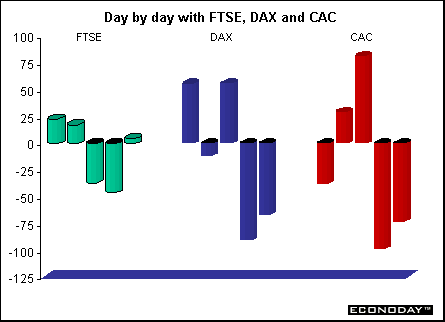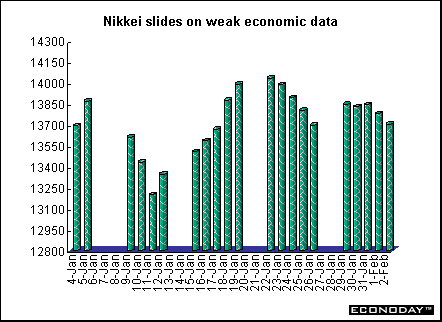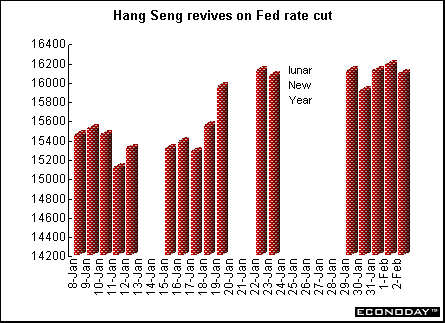
Europe and Britain
Investors brooded over reduced U.S. growth prospects after the Fed lowered interest rates. Hopes for a 75 basis point cut surfaced prior to the FOMC meeting, but once 50 was announced, investors began looking for a second inter-meeting rate cut. Overseas investors are worried that the 50 basis point reduction is not enough to boost U.S. demand for exports. And slower sales combined with a rising euro could exacerbate earnings problems. Until recently European exporters profited from the low euro in both increased sales and currency transactions, but now both are kicking in to hurt them as exports slow.

In Britain, there were few economic reports to give the market direction. Instead, the market looked ahead to next week's interest rate decision by the Bank of England's monetary policy committee. Analysts are expecting a 25 basis point reduction to 5.75 percent. This would be the first rate change since February 2000. A lower than expected increase in the preliminary estimate of fourth quarter gross domestic product (0.3 percent) was being interpreted as increasing the pressure for a cut. January MPC meeting minutes revealed that the vote to leave rates on hold was by the closest possible margin, 5 to 4.
The Paris CAC and Frankfurt DAX were hit by Nasdaq watching. Investors rotated between technology and old economy stocks as they attempted to find a safe harbor from overseas contagion. Despite this, the FTSE 100 and DAX have managed to improve their performance in January while the CAC was not so lucky.
Asia
Asian markets seem split on the impact of the rate cut. On one hand they rejoiced at lower interest rates. Yet on the other hand, they worried about declining exports to their major source of growth. The Fed's rate cut will help Asian companies by giving central banks more room to lower borrowing costs. Companies also hope the Fed's move will bolster sagging U.S. imports.

For some countries, relief has already come. In Hong Kong, the Monetary Authority lowered its base lending rates to banks to 7 percent from 7.5 percent. Hong Kong rates generally move in tandem with the United States as their currency is linked to the U.S. dollar.

All Asian markets finished on the plus side for the week. Other than the Nikkei, which has lost some ground, the other indexes tracked here have bounced back in January. Especially notable is the South Korean Kospi, which has regained over 20 percent in January, making a major dent in last year's 50 percent loss.


Introduction • Global Stock Market Indexes • Recap of Global Markets • Currencies • Indicator Scoreboard

The Bottom Line • Looking Ahead
© Econoday, 2000-2001. All Rights Reserved.
|